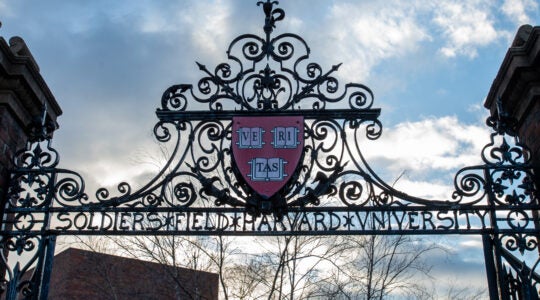
Some 40,000 haredi Orthodox men filled Citi Field in New York to rally against the dangers of the Internet, May 20, 2012. (Ben Sales)
NEW YORK (JTA) — The sellout crowd that filled Citi Field on Sunday night wore black and white, not the New York Mets’ blue and orange.
And instead of jeering the Philadelphia Phillies or Atlanta Braves, they faced a foe that was, to hear them talk about it, far more formidable: the World Wide Web.
“The Internet even with a filter is a minefield of immorality,” said Rabbi Ephraim Wachsman, a haredi Orthodox lecturer and rosh yeshiva of Yeshiva Meor Yitzchok in Monsey, N.Y. “This issue is the test of the generation. Your strength at this gathering will determine what Judaism will look like a few years from now.”
The rally to caution haredi Orthodox Jews about the dangers of the Internet drew a crowd of more than 40,000 men to the stadium, most of them wearing black hats. The group organizing the rally, Ichud HaKehillos LeTohar HaMachane, or Union of Communities for Purity of the Camp, barred women from attending — consummate with the haredi practice of separating the sexes.
In Yiddish and English speeches, rabbis from haredi communities in the United States, Canada and Israel decried the access that the Internet gives haredim to the world outside their community. Speakers called the Internet “impure,” a threat to modesty and compared it to chametz, or leavened bread, on Passover.
Almost no rabbi directly addressed pornography, which is prohibited by traditional Jewish law. Several speakers also lamented the Internet’s potential to distract men from learning Torah.
To a man, each of the rabbis who spoke said that Jewish law forbids Jews from browsing the Internet without a filter that blocks inappropriate sites. The speeches in Yiddish were broadcast with English subtitles on the stadium’s JumboTron.
Rabbi Yechiel Meir Katz, known as the Dzibo rav, compared the threat of the Internet to the dangers that Zionism and the European Enlightenment posed in the past to traditional Jewish life.
“A terrible test has been sent to us that has inflicted so much terrible damage” on haredim, Katz said. The Internet poses a greater threat to haredim than secularism did, he said, because “in previous challenges we knew who the enemy was. Today, however, the challenge is disguised and not discernible to the naked eye.”
The crowd ranged in age from small children to senior citizens. One participant, Yitzchok, said that although the speakers focused on the Internet problem rather than solutions, the event was “inspiring.”
“This is a beginning,” said Yitzchok, 43. “They’re coming to raise awareness. Every situation is different, everyone requires some filter.”
While haredim must limit their internet access, “many people do need to use it,” he added.
Before the rally began, about 50 people protested the event across the street from the stadium. Later, the counter-demonstration reportedly grew to some 300 people. Many of the protesters came from Footsteps, a local organization that helps those who leave haredi Orthodox life integrate into non-haredi society. In particular, they complained that Ichud HaKehillos invested money in the rally rather than in preventing child molestation in the haredi community.
“Their priorities are messed up,” said Ari Mandel, a former haredi. “Not only do they ignore child molestation, but they intimidate victims. If your house is on fire, you don’t worry about leaking pipes.”
The rally came after a series of reports in The New York Jewish Week, the Forward and The New York Times about haredi intimidation of victims of sexual abuse who have gone to the police to report their haredi tormentors.
JTA has documented Jewish history in real-time for over a century. Keep our journalism strong by joining us in supporting independent, award-winning reporting.





